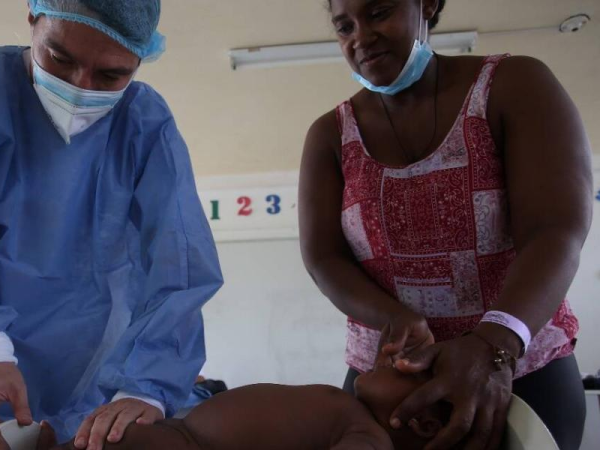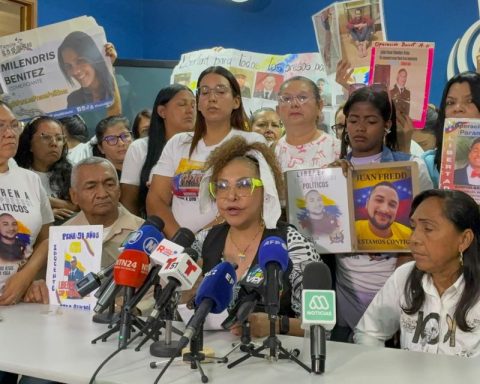Any medical part templateof those found in Internetwould serve to say that “The patient’s condition is very serious and, despite the treatments applied, his vital signs are worsening because the disease affects other organs.“But this is not about a person, but rather the situation of the health service in Colombia, whose current balance is frankly critical.The reason goes far beyond the increasingly deteriorating financial situation of the EPS, which are the first link in the chain of an insurance model that is still in force.
As had been warned for months, the domino effect has already fallen on the other actors, among which stand out clinics, hospitals and, of course, patientsThe data speak for themselves.
According to the records of complaints and claims kept by the National Health Superintendenceso far this year, a historic high has been reached with double-digit increases compared to the previous year, due to circumstances such as access barriers to treatments and medicines.
(You can read: What is the status of the regulation to prohibit marriages with minors in Colombia?).
For its part, the August newsletter of the organization Así Vamos en Salud shows that In the first third of 2024, more than 84,445 guardianships were recordedwhich is equivalent to a growth of 42% compared to the same period of the previous calendar year.
Health
“This suggests a deterioration in the guarantee of the right to health, at least from the perspective of the users of the system.”, the organization maintains. Almost in parallel, the worsening of the financial reality of the health service provider institutions (IPS) has also reached record figures.
The portfolio report that has been published for 25 years by the Colombian Association of Clinics and Hospitals concluded that, until last December, These institutions were owed 16.8 trillion pesos, some 700 billion more than six months ago.This financial crisis is quieter than that of the EPS, but no less serious.
(Besides: La Guajira will have a high-complexity hospital thanks to an agreement between Colombia and the UAE).
For a variety of reasons, ranging from From adherence to the Hippocratic oath to fear that banks will close their doors to them, most people find it difficult to express their concerns individually..
“IPS want to continue operating and stay open“, comments a manager of one of the most important in the country. “To do this, they must maintain good relationships with their sources of income, seek payment agreements, and avoid radical decisions with their employees.”, he adds. “It’s not a myth: they are doing everything possible to stay afloat, but they are almost at the point of running out of resources to buy supplies, and that will be the point of no return.“, he warns.

Health
Getting worse
There is still a lack of data to properly assess the impact of the economic crisis on the provision of health services. The increase in hospital beds in Colombia between 2023 and 2024, from 100,961 to 101,547 (one percent)it could even be an indication that things are not bad.
But other evidence says otherwise. An analysis soon to be published – based on news stories, social media posts, blogs and comments on the web – reveals a 119 percent increase in mentions of incidents such as lack of liquidity, non-payment of employees and cuts or closure of services at IPS. Headlines and press releases in recent months report the phenomenon throughout the country.
(You can read: The small country with the highest suicide rate in the world).
In June, Santa Marta media reported that the IPS Subsanar workers blocked Libertador Avenue due to lack of paymentand the same was reported by workers at IPS Vivessalud in Armenia and Medicuc in Cúcuta.
In Riohacha, even the pediatricians resigned. Our Lady of Remedies Public HospitalMeanwhile, doctors at the Virrey Solís IPS in Ibagué protested because, due to a lack of resources, they had to attend to patients in just five minutes. And at the Foscal clinic in Floridablanca, a 270 percent occupancy rate was reported in the emergency service, attributed to the closure of other IPS in the region. Similar cases have occurred in multiple towns.

Health
At the same time, EPS are going from bad to worse. A study by the firm Sectorial.co shows that the The ratio of expenses to income (technically called the accident rate), which should be less than 100, reached 103 in 2021, 106 in 2022, 109 in 2023 and continues to worsen in 2024: in the first quarter it reached 113 percent.
Even entities known for their proper management started the year on the wrong foot. This is suggested by a 125 percent accident rate at Sura or 100.7 percent at Salud Total, whose picture reveals the magnitude of the current problems.As if that were not enough, the progress of the recently intervened entities is worrying.
(You can read: These are the most stressful and unsatisfying jobs in the world).
During a political control session that took place last week in the Seventh Commission of the Senate it was revealed that The accident rate of the New EPS shot up to 151 percent, which once again confirms that the State is a very bad administrator..
The causes
It cannot be ignored that the increase in several negative indicators is something that has been happening for some time. Pointing out the Gustavo Petro’s government as responsible for everything that is happening, ignoring the fact that there are structural problems that have accumulated over several decades, would be unfair. However, what can be criticized It is the inability to fulfill the promise of reversing the trends and having deepened the size of the problem.

Health
According to Andrés Vecino, a health systems researcher, the difficulties in stopping the increase in the red numbers can be attributed to a general shortage of resources that has accelerated the vicious circle of lack of money. But the one that would have the most weight is “It is the lack of financial will to correct the problems of the health system“An example of this has just been observed.
In a letter addressed to the Minister of Financemore than a hundred personalities – including former ministers, former co-directors of the Bank of the Republic, former directors of National Planning, the Dane and Colpensiones – asked the Government to transfer 2.5 billion pesos from the Ministry of Health budget from the area allocated to infrastructure and personnel in the regions to that of health insurance. According to the letter, the entity had made the unprecedented decision to appropriate 5.05 billion “for uses other than those originally planned.”
(You may be interested in: Ministry of Health advances plan to intensify vaccination in Colombia).
If the reorientation were to be consummated, there would be no way to meet the outstanding payments in the coming months, aggravating the cash flow difficulties. Quickly, through his X account, President Gustavo Petro refused to accept the requestHe argued that the annual amount per system user that the State gives to the EPS had grown above inflation and insinuated an improper use of the resources that these entities must provide for the payment of services.
“There are tens of billions of pesos of lost technical reserves“, wrote the president. Such a response proves that, despite messages aimed at finding consensus solutions, in practice the positions have not changed.Specifically, the Government maintains the narrative that resources are sufficient and are promptly transferred by Adres to the EPS and the hospital network so that they, in turn, pay the various providers.
Come back and play
From this point of view, financial problems have their origin in the opacity in the management of money, intermediation, inefficiency, corruption and vertical integration.The latter, according to the official position, creates incentives for the profits of the conglomerates in the sector to be transferred to their own clinics or to their prepaid medical plans and for the expenses to be left to the EPS.
For the Executive, the usual flow is maintained and amounts to about seven billion pesos per month. According to Felix Martinez, director of Adresthis entity “has always rotated with chronometric precision the resources of the subsidized regime before the 10th of each month, and those of the contributory regime every week”.
(Besides: Why are there toxic metals inside Brazil’s tiger sharks?).
On the other shore, Various academics, patient associations and unions insist on the urgency of injecting more fundsstarting with the delays identified by the Constitutional Court, which issued instructions in this regard.
According to Ana María Vesga, president of Acemithe main union of the EPS, “A technical consensus on the financing of the system is essential, which must start by accepting that the UPC is insufficient and that the actors cannot bear the financial risk of recurrent default in the payment of the maximum budget funds that essentially cover high-cost medicines.”.

Health
According to the union leader, without this being resolved, it is not reasonable to consider the change of model that the Government is proposing.Let’s solve today, which is very critical“, he added. However, the Executive remains determined to resubmit a reform project, which will be submitted to the Capitol next week.
Despite meetings with multiple associations and unions, those who know about the matter maintain that the Petro administration continues to refuse to budge on the points that led to the failure of the initiative during the last legislature. It sounds incredible, but A few days before the proposal is announced, the internal debate within the cabinet continues on whether it should be presented as a statutory or ordinary law, whose procedures and processing instances are different..
(Further: Dog or cat pee smell? You can get rid of it with this home remedy).
Due to this circumstance, The chances of Congress giving the green light to a text of the same old tone are slim.unless a real effort is made to reconcile positions.
Ironically, the different sides agree that at this point, continuing in the current limbo is not the solution either. Maintaining the status quo will only make the problems even bigger, while increasing the probability of a real implosion leading to massive suspension of service. That said, the original proposal of the Historic Pact, referring to a primarily state-run system, focused on prevention, gives rise to countless doubts.

Health
One only has to look at the disaster that has been the attention that teachers receive to realize that one thing is the official discourse and another is its practical execution, especially when managerial capacity is scarce and the space for abuse increases. That the outlook has become much darker is impossible to deny.
The testimonies given by the departmental health secretaries on August 21 in Congress serve to confirm that it is ordinary Colombians who are already paying the personal price for the consequences of an immense institutional and financial mess.
As expressed Alvaro Puerto, president of the IPS Sies Saludthe situation cannot wait any longer and it is necessary to accept that there are structural problems that come from the past, that many of the criticisms from different sides are right, that urgent consensus and a short and focused reform are required.The consequences of prolonging the debate and uncertainty will be very serious, because time in health is not measured in days, but in lives.“, he points out.
RICARDO AVILA
In X: @ravilapinto

















